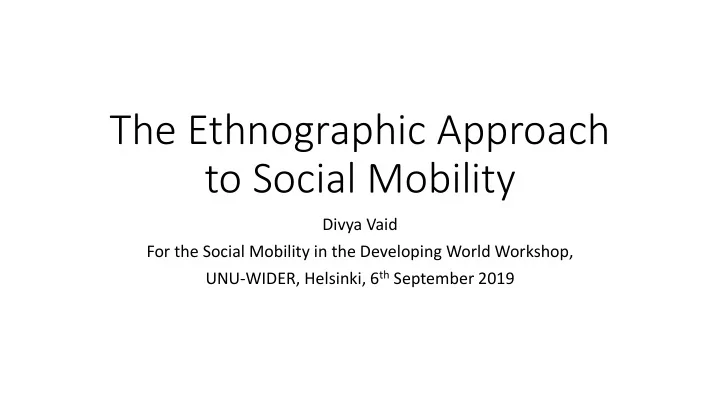

The Ethnographic Approach to Social Mobility Divya Vaid For the Social Mobility in the Developing World Workshop, UNU-WIDER, Helsinki, 6 th September 2019
Ethnography • Ethnography as a complex of methods • Method (e.g. participant observation, long term fieldwork, genealogies) • Mode of writing and description • To explore societies and cultures in the context and flow of everyday life • Aims to locate larger socio-economic processes in the lives of human beings and societies with detailed descriptions
Defining Mobility • Mobility through migration/spatial mobility intertwining with social mobility in contrast with sociology/economics where a particular language of inter-generational transfer is used. • Most anthropology largely focuses on particular strands that may work together to provide a picture of mobility (e.g. some have looked at caste, some at class etc.) • Components of mobility – all that influences peoples lived experience of mobility - e.g. labour, class, caste, race, status, religion, space, gender – and that which influences opportunities of mobility – e.g. education, capital etc. – and that which reproduces inequalities – e.g. the family
Social construction of mobility Construction of social mobility as “Ideas” of social mobility • Aspirations • Religion • Family • Education and networks as possible drivers in construction of ideas of mobility • Anxieties of possibilities of downward mobility or retaining status
The field of social mobility Where the practice of social mobility takes place – in enabling or in denying it • Labour and Class • Caste • Race • Family • Spatial Movement • Actual experience (anxiety) of downward movement
Field and Ideas intersect • For instance with regard to migration – spatial mobility • Travel to improve lives – might improve, might not (classed or de-classed) • Claims to class- but, in actual indicators one is not middle class or socially mobile • Considering local definitions of mobility
Methods and Critique • Subjectivity? Understanding meaning • Returns and revisits • Tools such as genealogies and life histories to build narratives of movement and social change
Recommend
More recommend